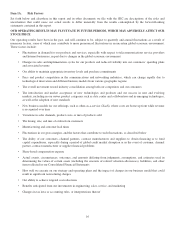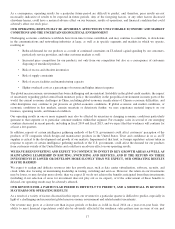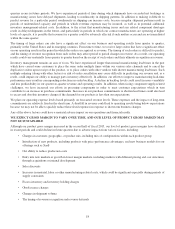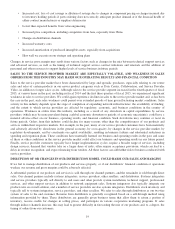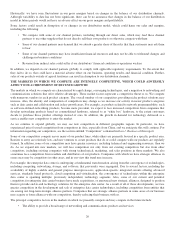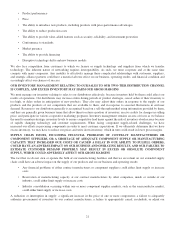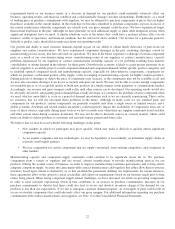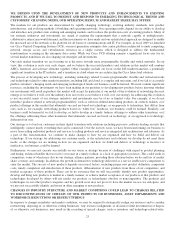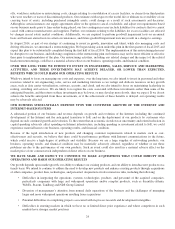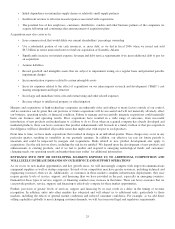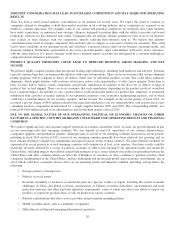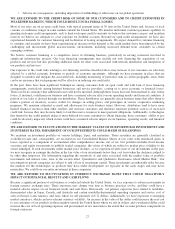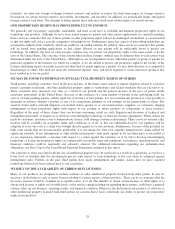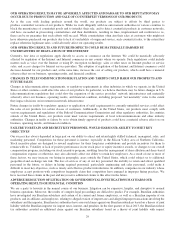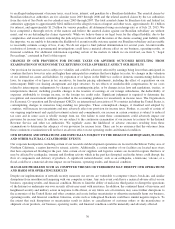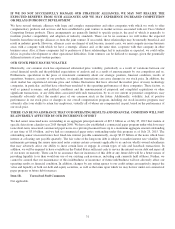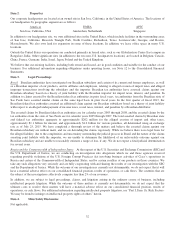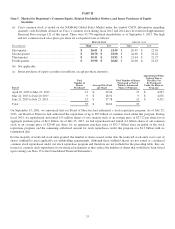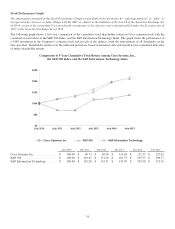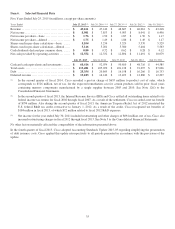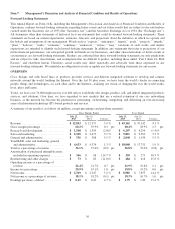Cisco 2015 Annual Report Download - page 34
Download and view the complete annual report
Please find page 34 of the 2015 Cisco annual report below. You can navigate through the pages in the report by either clicking on the pages listed below, or by using the keyword search tool below to find specific information within the annual report.INDUSTRY CONSOLIDATION MAY LEAD TO INCREASED COMPETITION AND MAY HARM OUR OPERATING
RESULTS
There has been a trend toward industry consolidation in our markets for several years. We expect this trend to continue as
companies attempt to strengthen or hold their market positions in an evolving industry and as companies are acquired or are
unable to continue operations. For example, some of our current and potential competitors for enterprise data center business
have made acquisitions, or announced new strategic alliances, designed to position them with the ability to provide end-to-end
technology solutions for the enterprise data center. Companies that are strategic alliance partners in some areas of our business
may acquire or form alliances with our competitors, thereby reducing their business with us. We believe that industry
consolidation may result in stronger competitors that are better able to compete as sole-source vendors for customers. This could
lead to more variability in our operating results and could have a material adverse effect on our business, operating results, and
financial condition. Furthermore, particularly in the service provider market, rapid consolidation will lead to fewer customers,
with the effect that loss of a major customer could have a material impact on results not anticipated in a customer marketplace
composed of more numerous participants.
PRODUCT QUALITY PROBLEMS COULD LEAD TO REDUCED REVENUE, GROSS MARGINS, AND NET
INCOME
We produce highly complex products that incorporate leading-edge technology, including both hardware and software. Software
typically contains bugs that can unexpectedly interfere with expected operations. There can be no assurance that our pre-shipment
testing programs will be adequate to detect all defects, either ones in individual products or ones that could affect numerous
shipments, which might interfere with customer satisfaction, reduce sales opportunities, or affect gross margins. From time to
time, we have had to replace certain components and provide remediation in response to the discovery of defects or bugs in
products that we had shipped. There can be no assurance that such remediation, depending on the product involved, would not
have a material impact. An inability to cure a product defect could result in the failure of a product line, temporary or permanent
withdrawal from a product or market, damage to our reputation, inventory costs, or product reengineering expenses, any of which
could have a material impact on our revenue, margins, and net income. For example, in the second quarter of fiscal 2014, we
recorded a pre-tax charge of $655 million related to the expected remediation costs for certain products sold in prior fiscal years
containing memory components manufactured by a single supplier between 2005 and 2010. The corresponding liability was
reduced by $164 million related to an adjustment recorded in the third quarter of fiscal 2015.
DUE TO THE GLOBAL NATURE OF OUR OPERATIONS, POLITICAL OR ECONOMIC CHANGES OR OTHER
FACTORS IN A SPECIFIC COUNTRY OR REGION COULD HARM OUR OPERATING RESULTS AND FINANCIAL
CONDITION
We conduct significant sales and customer support operations in countries around the world. As such, our growth depends in part
on our increasing sales into emerging countries. We also depend on non-U.S. operations of our contract manufacturers,
component suppliers and distribution partners. Although sales in several of our emerging countries decreased in recent periods,
including in fiscal 2014 and fiscal 2015, several of our emerging countries generally have been relatively fast growing, and we
have announced plans to expand our commitments and expectations in certain of those countries. We expect that the weakness we
experienced in recent periods in several emerging countries will continue for at least a few quarters. Our future results could be
materially adversely affected by a variety of political, economic or other factors relating to our operations inside and outside the
United States, including impacts from global central bank monetary policy; issues related to the political relationship between the
United States and other countries which can affect the willingness of customers in those countries to purchase products from
companies headquartered in the United States; and the challenging and inconsistent global macroeconomic environment, any or
all of which could have a material adverse effect on our operating results and financial condition, including, among others, the
following:
• Foreign currency exchange rates
• Political or social unrest
• Economic instability or weakness or natural disasters in a specific country or region, including the current economic
challenges in China and global economic ramifications of Chinese economic difficulties; environmental and trade
protection measures and other legal and regulatory requirements, some of which may affect our ability to import our
products, to export our products from, or sell our products in various countries
• Political considerations that affect service provider and government spending patterns
• Health or similar issues, such as a pandemic or epidemic
• Difficulties in staffing and managing international operations
26


